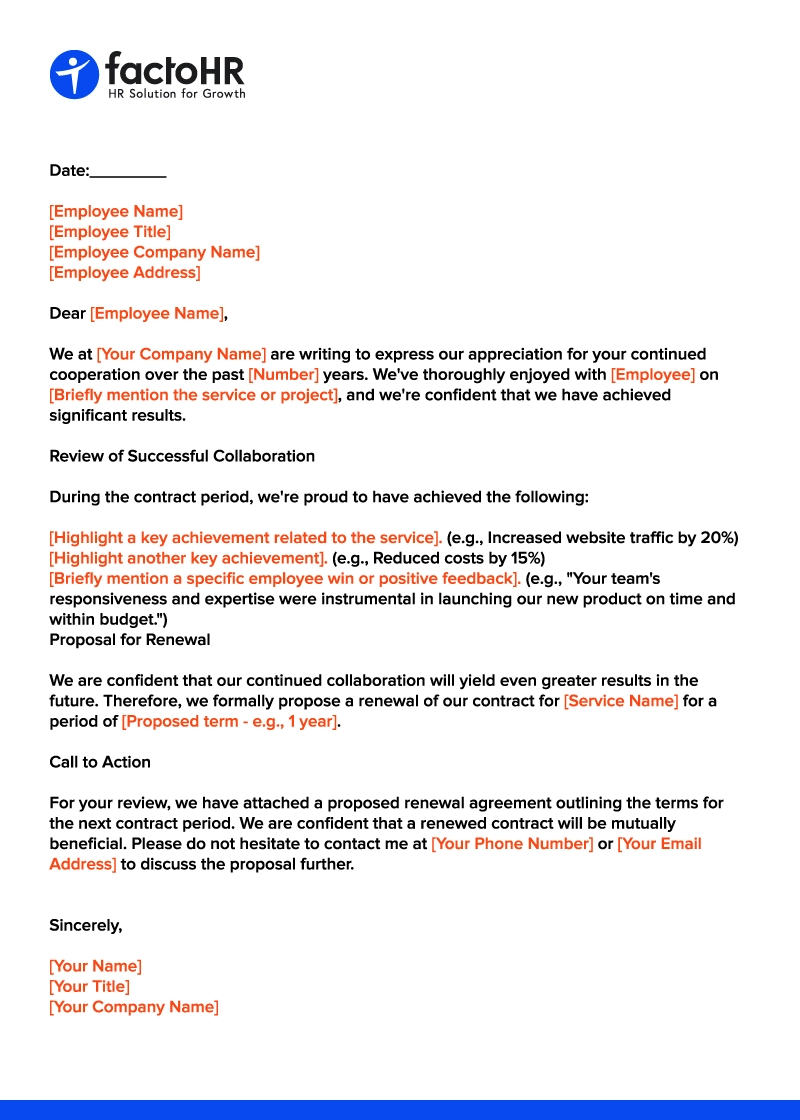Employee Contract Renewal Letter: Free Template and Format

Download Employee Contract Renewal Letter Word Format For Free
Table of Contents
Contract renewal means to start the agreement again after its expiration date. Contracts form the foundation per the terms and conditions of collaboration between two parties. Maintaining strong and reliable relations is crucial for success in the fast-paced business world. However, contracts are set for a certain period of time that eventually ends. Here’s where a well-crafted contract renewal letter comes into play.
A contract renewal letter goes beyond just extending the business relationship. There are multiple purposes that are served through such a contract. It is a formal document sent to you that allows you to express your appreciation for the past collaboration. Past experiences open the door for a smooth transition into the next term, potentially with adjustments to better suit current needs. Finally, a well-written letter demonstrates professionalism and reinforces the positive aspects of your ongoing work.
Contracts are legally binding documents. This blog is a complete guide to writing effective renewal letters but is not a substitute for legal advice. When dealing with complex contracts or changes in terms, it is recommended that you consult a lawyer.
Why Renew Contracts?
In today’s dynamic business landscape, established relationships hold immense value. When you renew a contract, you continue working with an employee who understands your needs and operates effectively within your established system. This translates to several advantages.
Firstly, maintaining established business relationships fosters stability and predictability. You gain a sense of comfort knowing you can rely on a proven employee, and they benefit from the consistency of a familiar service provider. This eliminates the time and resources typically associated with onboarding an employee, allowing both parties to focus on core business activities.
Renewals can also lead to cost savings. Finding employees involves a significant investment in time and resources. The cost of onboarding, training, and integrating them can be substantial. Conversely, contract renewals eliminate these costs, allowing you to continue a productive collaboration without incurring additional expenses.

Types of Contracts Requiring Renewal
The world of business revolves around agreements and many of these agreements have defined lifespans. Here’s a look at some common contract types that necessitate renewal:
Maintenance Contracts
These contracts ensure the ongoing upkeep and repair of equipment, software, or facilities. Renewal considerations might involve adding new equipment to the maintenance plan, changing service frequency based on usage patterns, or potentially upgrading service packages. (For example, a manufacturing plant renews its maintenance contract for critical machinery, opting to include preventative maintenance services not covered in the original agreement.)
Subscriptions
In today’s digital age, subscriptions are universal. These contracts provide access to software, cloud storage, online services, or memberships for a defined period. Renewal considerations for subscriptions often involve changes in user needs, availability of new features or upgrades, and potential price adjustments. (For example, a company renews its subscription to project management software after realizing significant improvements in team collaboration and efficiency during the initial subscription period.)
Leases
These contracts govern the use of property, such as office space, retail storefronts, or even machinery. Lease renewals involve considerations like potential rent increases based on market value, adjustments to lease terms (e.g., duration, permitted uses), and potential renovations to the property. (For example, a restaurant renews its lease for its current location after successfully building a loyal customer base and negotiating favorable terms for minor interior renovations.)
Crafting a Winning Contract Renewal Letter
Structure and Format
The first impression matters, and this also holds true for contract renewal letters. A professional and well-formatted letter sets the tone for your message and demonstrates your attention to detail. Here are some key elements to consider:
Formatting
- Use a clear and easy-to-read font (e.g., Arial, Times New Roman) with a size appropriate for business communication (e.g., size 11 or 12).
- Maintain consistent spacing throughout the document (e.g., single or double line spacing).
- Utilize bullet points or numbered lists to enhance readability when highlighting key achievements or proposed changes.
- Ensure proper margins on all sides of the page.
Organization
- Structure your letter logically, following a clear introduction, body, and conclusion.
- Keep the letter concise and to the point, aiming for a length of one to two pages.
Essential Information
- Include the recipient’s name, title, and company address at the beginning of the letter.
- Include the date the letter is written.
- Craft a clear and concise subject line that explicitly states the purpose of the letter (e.g., “Contract Renewal Proposal for [Service Name]”).
- Use a professional company letterhead that includes your company logo and contact information.
Tone
- Maintain a professional yet courteous tone throughout the letter.
- Express gratitude and appreciation for the existing collaboration.
- Use confident and persuasive language when highlighting your value proposition and proposing renewal terms.
- Proofread the letter meticulously before sending it to ensure no grammatical errors or typos.
By adhering to these formatting and structure guidelines, you create a visually appealing and well-organized letter that effectively conveys your message and increases the chances of a successful contract renewal.

Contract Renewal Letter Sample
Subject: Contract Renewal
Dear [employee Name],
We at [Your Company Name] are writing to express our sincere gratitude for your employment over the past [Number] years. We’ve thoroughly enjoyed working with [Employee Name] on [Briefly mention the service or project], and we’re confident that our combined efforts have yielded significant results.
Sincerely,
[Your Name][Your Company Name]
Contract Renewal Letter Format

Review of Successful Collaboration
Following the introductory appreciation, dedicate a section to reviewing the achievements and positive outcomes of the existing contract. This serves two purposes: it reminds the employee of the value you’ve delivered and strengthens your case for renewal. Here’s how to approach this section:
Highlight Achievements
Briefly discuss key milestones reached or significant accomplishments achieved during the contract period.
Tailor this section to the specific nature of your agreement.
For example, you might mention increasing brand awareness or website traffic if you provide marketing services.
Quantify Your Value
Show the value you’ve brought to the employee whenever possible using quantifiable data.
Did your services increase sales, improve efficiency, or save costs for the employee?
Including specific numbers demonstrates the tangible impact of your work and strengthens your position for renewal.
Here’s an example: “Our social media marketing campaign for [Employee Name] resulted in a 20% increase in website traffic and a 15% conversion rate for lead generation.”
Showcase Success Stories
Consider incorporating a brief success story or positive employee testimonial to further illustrate your value.
This personalizes the message and resonates with the employee on an emotional level.
By effectively reviewing your successful collaboration, you remind employees of the positive outcomes they’ve achieved and subtly encourage them to continue this path of success through contract renewal.
Additional Tips for Effectiveness
The final touches can make a significant difference. Here are some additional tips to ensure your renewal of contract letter is impactful:
Proofreading is Key:
Meticulously proofread your letter before sending it. Typos and grammatical errors can create a negative impression. Utilize spell-check features and consider having a colleague review the letter for any errors you might have missed.
Personalization Matters:
Whenever possible, personalize your letter. Address the recipient by name and tailor the content to the specific nature. A personalized touch demonstrates that you value the employee and their unique needs.
Alternatives to Renewal: Renegotiation and Termination
While contract renewal is often the desired outcome, there are situations where it might not be the best course of action. Here are some alternatives to consider:
Renegotiation
Circumstances can change during a contract period. Needs evolve, and challenges may arise. Renegotiation allows both parties to address these changes and potentially salvage the relationship.
Key Considerations for Renegotiation: Clearly define the aspects of the contract you wish to renegotiate (e.g., pricing, service scope, contract term).
Gather data to support your request for renegotiation. This could include industry benchmarks, cost changes, or evidence of unforeseen challenges.
Be prepared to offer concessions yourself. Renegotiation should be a win-win situation for both parties.
Termination
In some cases, contract termination may be necessary. Here are some potential reasons:
Poor Performance: If an employee consistently fails to meet performance expectations outlined in the contract, termination may be justified.
Breach of Contract: A serious breach of contract by either party may warrant termination, depending on the severity of the breach.
Legal Considerations
It’s crucial to remember that contracts are legally binding documents. Before initiating renegotiation or termination, review the contract terms carefully. Consulting a lawyer is highly recommended, especially in situations involving complex contracts or significant disagreements. Following the proper legal protocols ensures a smooth and compliant termination process.

Conclusion
A well-crafted contract renewal letter is a powerful tool for securing continued success with your employee. By expressing gratitude, highlighting past achievements, and proposing a clear path forward, you ensure a strong foundation for the future. Additionally, addressing evolving needs or proposing beneficial changes can demonstrate your commitment to mutual growth. Remember to consult a lawyer for complex contracts or situations requiring specific legal advice on contract renewals to ensure compliance and protect both parties’ interests.
Frequently Asked Questions
1. What Are Some of the Benefits of Renewing Contracts?
Stability and predictability: Renewing contracts allows you to continue working with a familiar employee, saving time and resources compared to onboarding a new vendor.
Cost savings: Finding and vetting new employees can be expensive. Renewing a contract avoids these costs.
Stronger relationships: Continued collaboration fosters trust and strengthens relationships with your employees.
2. What Types of Contracts Typically Require Renewal?
- Service agreements (e.g., cleaning services, IT support)
- Maintenance contracts (e.g., equipment repair, software updates)
- Subscriptions (e.g., software, cloud storage)
- Leases (e.g., office space, retail storefronts)
3. What Information Should I Include in a Contract Renewal Letter for an Employee?
- A clear statement of your intent to renew the contract.
- The proposed term of the renewed contract.
- Any changes to salary, benefits, or job responsibilities (if applicable).
- An invitation for the employee to discuss the offer.
4. What Are Some Alternatives to Contract Renewal?
- Renegotiation: If circumstances change, renegotiation allows both parties to address evolving needs.
- Termination: Contract termination may be necessary in cases of poor performance, breach of contract, or mutual agreement. Remember to consult a lawyer before terminating a contract, especially for complex situations.

Modernize your HR tasks with factoHR today
Experience the digitalization of everyday business activities with factoHR's modern and compatible solutions for every need.

© 2026 Copyright factoHR


